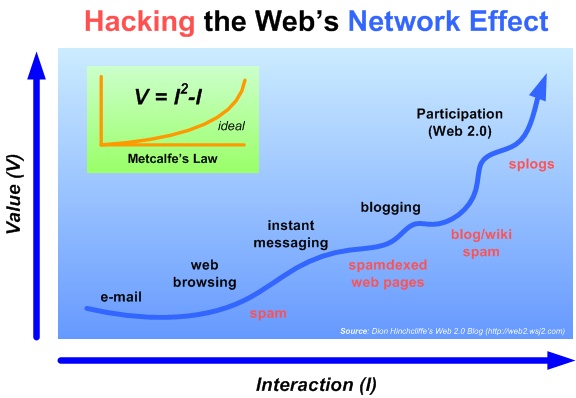Network effects from user contributions are the key to market dominance in the Web 2.0 era. So said Tim O’Reilly recently in his epochal What is Web 2.0?
I would also add that effects from exploits and hacks of open communication networks is a constant threat to their continued usefulness. In other words, network effects can be their own worst enemy. Web 2.0 adopters trying to achieve network effects deliberately will need to keep this closely in mind.
The synergistic power of networks have been a well known phenomenon during almost the whole history of the Internet. Originally it was known as Metcalfe’s Law, which said that the value of a network is equal to approximately the square of the number of users in any networked system. The more users that communicate on a network, the more value it has. Network effects are a primarily reason that the Web is such a vibrant and exciting place today.
According to Wikipedia, a network effect “causes a good or service to have a value to a potential customer dependent on the number of customers already owning that good or using that service.” And because of the profound interconnectedness of the Web, we’ve all seen countless examples of network effects. Recent examples on the Web include everything from Wikipedia itself, to eBay’s auction network, Google AdSense, and even the burgeoning market of Web 2.0 mash-ups like HousingMaps.
Of course, when a network effect’s value becomes pronounced and hence widespead, it begins to attract those who will try to exploit its power. With the advent of e-mail came the scourge of e-mail spam. With web pages came spamdexing, then blog and wiki spam came next. There are numerous other examples and they all show it’s a two edged sword. Open participation mechanisms like the blogosphere (which are the most valuable as well) are particularly susceptible to exploits.

How many of us have abandoned e-mail accounts due to the relentless influx of spam or couldn’t find what they were looking for on search engines because of the results were clogged with spamdexed pages?
With each new type of network effect (of which blogs, wikis, and many other Web participation mechanism are a prime example) came those who hacked the related network effect for their own selfish gain. Selfish in terms of not contributing value to receive value, which is the central to Web 2.0’s architecture of participation.
The now famous rise of blogging, recently described by Technorati’s David Sifry as continuing to “to double about every 5 months” with over 19.6 million weblogs in existence as of this writing, is now a major target of network effect hacking. Chris Pirillo’s widely covered and somewhat intemperate rage yesterday against splogs (spam blogs) is probably only the tip of the iceberg for what we have in store for us.
Harmful hacks against participation and collaboration mechanisms will continue to have deleterious effects on the Internet. The entire Web is at risk (though probably not severe yet) despite heroic attempts to prevent it including advanced algorithms to figure out which blogs are real, and which are created by automated exploits.
If even forwarding thinking Web leaders like Google are having trouble, what chance does the rest of the Web have when folks try to game the system?
Obviously, unwanted exploits of the open, participatory mechanisms that make Web 2.0 so useful to everyone will be something that we will all end up spending an enormous amount of time controlling. Like O’Reilly’s Nat Torkington pointed out over the summer, the current requirement for continuous, partial attention to our social networking machines is giving way for a powerful desire for committed full attention focus.
To achieve this, we must have “trusted filters, trusted protectors, trusted concierge, human or technical, removing distractions and managing boundaries, filtering signal from noise, enabling meaningful connections, that make us feel secure, [and providing this is] the opportunity for the next generation.“
All of this means that as we move to the next generation of the Web, how we guard our precious personal attention and focus will become ever more important, even while being a mostly unsolved problem today despite calls for quick fixes.
Mark my words: Those that discover and provide simple, effective attention and participation safeguards will reap correspondingly vast rewards.
Technorati: web2.0, networkeffect, socialsoftware
